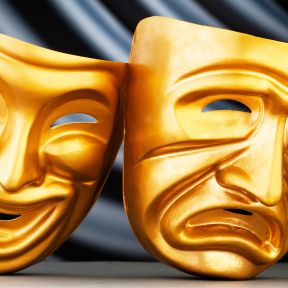Has Someone Upset You? The Pain Is Yours. End cycles of drama by bringing awareness and action to a relationship.

KEY POINTS-
- Victims’ pain is real, but people can learn to avoid the suffering of victimhood.
- Practicing awareness can lead to ownership of disempowering drama cycles in relationships.
- People can learn to identify drama cycles and sidestep them, moment by moment.
We've all been there in some way. Things turn out quite badly because someone messed up. Someone has let us down or caused us harm in some way. We lash out, freak out, shut down, and blame those who have done us wrong—perhaps very wrong. Many people unfortunately are outright abused and traumatized.
As hard to accept as it might be, the responsibility for the impact of all these situations is yours. As a psychologist and as an individual, I've arrived at the inevitable truth that once you're “triggered”—once something's happened and you are having emotions, a sensory experience in your body, thoughts are here, and once you're doing things—those are yours and they are absolutely 100% your responsibility.

Roman emperor and Stoic philosopher Marcus Aurelius said it well: “Our destiny is not created by our circumstances, but by our response to those circumstances.” This is what I mean by “responsibility”—you are the only one who is thinking, feeling, and acting these reactions to harm or discomfort brought to you. Only you can truly do anything with them.
Lost in the Drama Triangle
In 1968, psychologist Stephen Karpman proposed a model, the “drama triangle,” to account for the conditioned (habitual) patterns people exhibit that create cycles of suffering. According to Karpman, people learn to avoid emotional pain by shifting between one of three “roles” in their relationships, the “perpetrator” (aggressive, blaming, and critical of others), the “rescuer” (with an unhealthy need to make peace and save others), and the “victim” (those who shift into states/behaviors of helplessness and assumptions that uncontrollable negative outcomes will continue).
People learn to play defense against the discomfort of authentically, directly stating needs and pain experiences. People fall into these habitual traps that reduce some discomfort in the short term but bind them to unhealthy relationship dynamics with others going forward.
This is a hard pill to swallow for many and it is not a heaping of blame to those who have been victimized, traumatized, or abused. To be clear, victimization and trauma are real. To say that the responsibility for the effects of someone causing harm—whether it be trauma or mere annoyance—is to seek empowerment for those who are impacted by others’ harmful actions. To say that the responsibility for your upset/pain is yours is to argue for the ending of drama triangle repetitions.
Research has shown that those identifying with victimhood are more likely to endorse statements such as:
- "I feel helpless around other people” or …
- “Others tend to leave, reject, or abandon me” or …
- "I feel like I can never do anything right.”
In research conducted by Lac and Donaldson (2020) for the development of the Drama Triangle Scale, people identifying with the victim role were more likely to report detrimental relationship outcomes, anxiety, depression, and interpersonal stress.
We do ourselves or others who have been victims no favors by permitting victim role patterns (and the “dance” with perpetrators and rescuers who blame/save them) to continue. Psychologist and meditation teacher Fleet Maull argues in his book, Radical Responsibility, that “by clearly seeing and owning our patterns of conditioned reactivity, we can finally move in the direction of genuine autonomy and self-empowerment.”
Quitting the Blame Game
So, perhaps all I’m saying makes sense to you. Perhaps you’ve been aware of the “complete responsibility for your own reactions” cliché for many years. And yet... how often do you and I still at times blame others and put the responsibility (and our well-being in each moment) in the lap of those we believe to have wronged us?
“If my parents hadn't –” … “If my sibling had not –” … “Because of my partner neglecting my needs I can’t –” … “Because of that person who did that to me. I am now stuck, suffering, screwed, blocked, or in various ways not able to have the life I deserve.”
Most of us have done this in our minds and then through our actions in small or large ways many times in our lives. Again, if you are triggered, it's yours.
Someone may have been causal—they did X, Y, or Z and as a result, there is displacement, discomfort, loss, or pain, perhaps of the deepest, darkest variety. That person is causal, and surely merits accountability, justice, and consequence. The pain is yours to compost into healing and empowered possibility.
What Will You Do?
True ownership has nothing to do with focusing only on a thought-story of blame being placed on the person(s) who did whatever was done. They are causal and yet you are the only source of creation for the rest of your life.
Here’s my question, my “momentology” inquiry: In the unfolding now, what is happening in you—in the thoughts, feelings, and your actions about what happened?
In learning to notice any habit of blame and shame as they first are born, you own them. You stop short of believing their drama-perpetuating lies. Of course, when someone does something that triggers us, we don’t feel good. It’s not fun. And yet, the truth—our truth—is that the experience is ours. It’s now bouncing around in our minds, our emotions are inflamed, our behaviors are at risk for going out of joint. The other person may be off salivating on a sandwich at this point.
We must guard against habits of disownership of our undeniable truth. We must step up to our responsibility, and our experience of moments, with all the ownership we can muster.
I am not saying ownership always tastes great. Flavors come and go. Our sacred responsibility as owners never does.
Try This: “They’re the Cause, and I’m the Creating”
Take out a journal and spend a few minutes writing about the following:
- What is something that has happened that you have a hard time accepting responsibility for the impact of it in your life now? It likely emerged in memory while reading this. Bring it back to mind and allow it to be vivid in awareness here and now.
- Who can see, feel, and “touch” this memory? Who can do anything about how this memory of pain continues “living” inside you? Knowing that another may be causal, what might owning this impact on your life lead to if done fully and unflinchingly? What might you do, now, in this moment to care for yourself, to find support, to seek justice, to turn pain toward active possibility?
- Questions and Answers
- Opinion
- Story/Motivational/Inspiring
- Technology
- Art
- Causes
- Crafts
- Dance
- Drinks
- Film/Movie
- Fitness
- Food
- Games
- Gardening
- Health
- Home
- Literature
- Music
- Networking
- Other
- Party
- Religion
- Shopping
- Sports
- Theater
- Wellness
- News
- Culture
- War machines and policy

